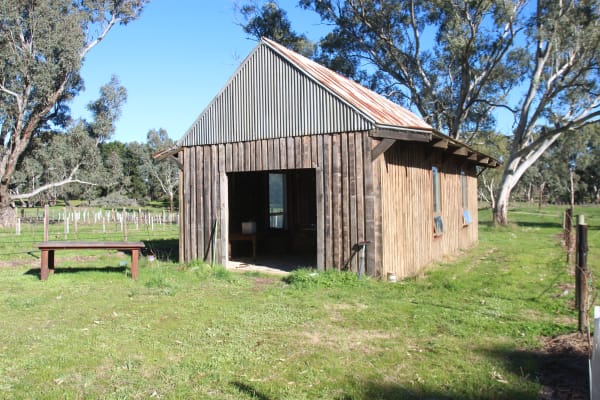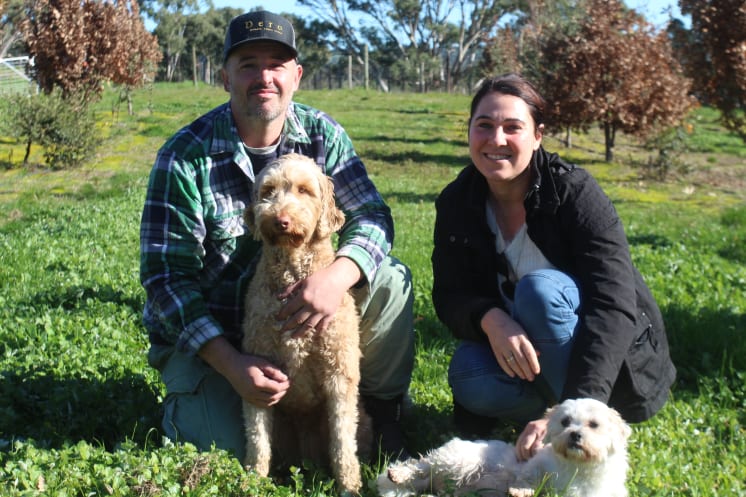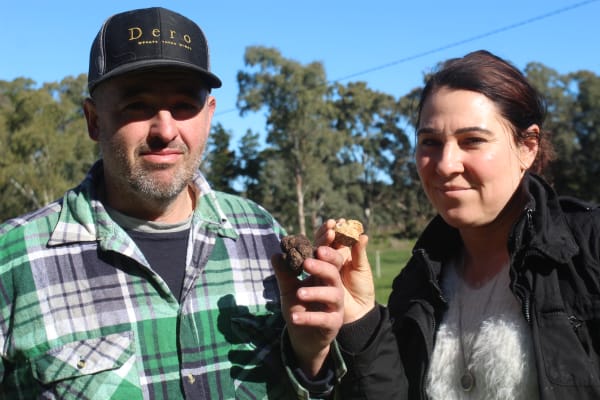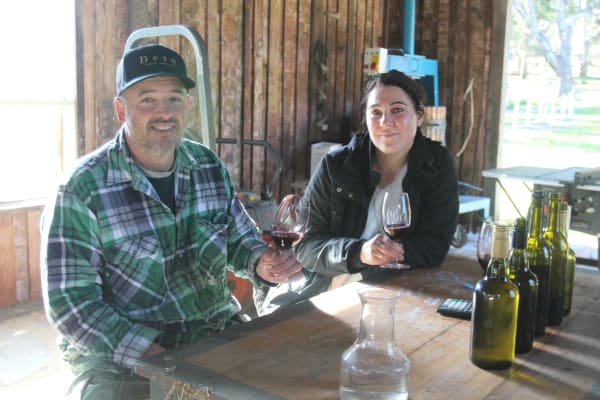SABINA and Ben Kelley of Barossa Valley Truffle Co had a clear plan in mind when moving from New South Wales to the Barossa Valley in 2019 – to grow world-class truffles in a famous food region.
Truffles are considered the second-most expensive food in the world at around $3/g, behind only saffron (roughly $10/g), and are incredibly difficult to farm.
In fact, the couple were informed by the truffle hunting group Adelaide Hills Truffle Dogs that when they pulled up their first black truffles, they were the first South Australians in three years to do so.
Explaining the process, the Kelleys said they cannot think of another farming pursuit to compare it to, particularly due to the amount of waiting required.
“I think it’s unique because you don’t know what your yield is going to be like, you don’t know what the quality is going to look like,” they said.
“It’s all underground.
"You’ve got no idea what’s happening under there – if worms are eating them, or if you’ve got an insect problem, or if the soil drainage isn’t good enough they can rot.
The average wait to find a truffle is usually around eight years, so it’s a long period of time to plan, do that outlay and then wait.
“Basically, you need to pull out weeds by hand and mow by hand, or whipper-snip. There’re no chemicals – you don’t want to kill the spore – so it’s actually really hard and labour intensive.
“Truffles hate competition, so you need to make sure to keep the area around the base of the tree pretty clear so the truffle can survive, and then the spore will overtake that and will start killing the grass and weeds itself.
“You test the soil for suitability – its pH level, and various nutrients in the soil – and then you make whatever additions you need to get the pH balance right to host the spore on the tree.
“Truffles grow wildly in Europe, but they don’t in Australia – at least not that we know about – so you have to buy a tree that has been deliberately inoculated with the spore.
“Over time, that spore develops into a truffle, and are eventually harvested in the winter, since the ideal truffle-growing weather is frost without too much rain.”
With no other truffle farms in the area to lean on for advice, the Kelleys had to experiment with their initial setup.
“After we modified our soil and got it ready, we marked out our rows of trees by hand with a tape measure, planted the inoculated trees, and then crossed our fingers,” they said.
“In the early stages it’s all about just keeping the trees alive. We planted French and English oak, which produces French black truffle, and we also planted stone pine trees which produce white truffle.
There are no guarantees either – some people we know have had 1000 trees for up to 10 years, and have still got no truffles to show for it.
“There’s another one we know about interstate where someone had about four acres. It was doing really well, so he decided to extend and plant more right next door, and never found a truffle.”
While the Barossa is known for its fine dining and world-famous wine, its truffle industry was essentially non-existent, but that is no longer the case after the Kelleys’ remarkable early success.
After being told to prepare for a wait of up to eight years before producing their first truffles, the Flaxman Valley farm began showing promising signs just three years in, so they decided to call in the truffle dogs for a closer inspection.
“It was very early,” they said.
“We actually asked the truffle hunters when we first started seeing signs like holes being dug by animals, and they said it could be truffle, but it’s too soon.
“They were hesitant about coming out, but they eventually did near the end of the season, and we found truffle in a couple of minutes.
“We think there’s a little hocus pocus, and some uniqueness to our property, because we’re in a 35 million-year-old meteor crater, called the Flaxman Crater – and we’re right near the epicentre.
“So 35 million years ago this meteor split in two and one landed kind of right here, so this valley was formed by that meteor impact, and we’ve had people here asking us about if we’ve seen any signs of deformed rock, but at that point it was all hocus pocus to us.

“Some of the vineyards in the local area produce some of the most expensive wine in Australia – up to $800 a bottle – and some attribute that to the unique conditions in the soil, including lots of extra rock that helps heaps with drainage.
“The truffle dog company that we bring in are shocked at how quick everything is progressing… they were asking us if we’re sure the trees were that young – which they were, because we only bought the property and planted the trees in 2019 – but they’d never seen anything like it.”
Now in their second harvest, Barossa Valley Truffle Co are the exclusive truffle supplier of close to 10 local Barossa restaurants, and they got their foot in the door the old-fashioned way.
“We started with the restaurants we like to eat at,” they said.
“Talking to chefs, cold-calling, letting them know what we have, and they are always interested in having a look.
“Because truffle usually shrink by around two per cent per day after being removed from the ground, we will usually dig them up on our hands and knees with a spoon the morning we are going to meet with chefs.
We had our first meeting with Maggie Beer recently and she was extremely excited over the phone saying how she had never tried white truffle.
“We probably pull up one white truffle for every 40 black truffles, so it is rare and hard to produce, but all the feedback we have been getting is incredibly supportive and has us really excited about what we’re doing.”
Although the truffle business is now booming, there was no assurance that their property would ever produce any, so the Kelleys supplemented that income with a wine label that has also now taken off.
When they arrived in 2019, a grape shortage meant the Kelleys were unable to buy excess grapes from local vineyards, so they decided to make the most of their super soil and grow their own.
Under the name Phase Three Wines, the Kelleys decided to lean on Ben’s lifetime of expertise in the wine industry to create their own brand.
“We made about 80 bottles that first year, and it was pretty good, and then the next year I had ads on Gumtree and everywhere saying ‘grapes wanted, cash paid’,” Ben said.
“Eventually people got in touch with us and said we could come and take some of the grapes that they couldn’t harvest, usually because it was on a steep hill where their machines couldn’t access, so we brought in a lovely group of pickers to handle it.
“We got all our equipment and tanks off Gumtree and Facebook and everything, and that’s why we called our signature label Dero – because I’m a nobody, and it was nothing fancy, but people loved it.
“Eventually I realised that the only way to get low-cropping, intense fruit is to grow it yourself… we’re not looking to get a great return from our vineyard, we just want to make really cool wine, so we focus on growing the best fruit we can without having any commercial pressure to produce a certain number of bottles.
“We don’t add water, or acid, it’s just natural fermentation. No wild yeast, no adds, and after we got a great 95-point review early on, our website took off.”
During truffle season, Barossa Valley Truffle Co have a spot at the Barossa Farmer’s Market, where they recently debuted their new truffle butter, and offer the public chances to buy small pieces of truffle for affordable prices.
“One of our favourite sales wasn’t a big deal with a restaurant or anything like that,” they explained.
“It was a $13 sale to someone who grated it over their hot chips… we want everyone to be able to experience and enjoy it.”
The Kelleys have plans in the near future to create an experience on their property where people can book their very own truffle hunt, with a chef on-site to turn it into a meal, which will be paired with their own wines.
They can be found on Instagram and Facebook by searching for Barossa Valley Truffle Co, and their wine is available for purchase online: phasethreewines.com.au








